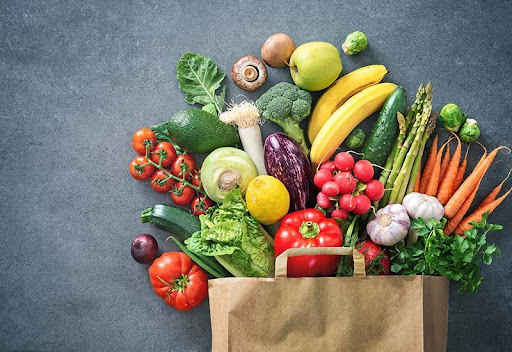-
 play_arrow
play_arrow
PUKfm
-
 play_arrow
play_arrow
London Calling Podcast Yana Bolder
-
 play_arrow
play_arrow
Summer Festival Podcast Robot Heart
-
 play_arrow
play_arrow
Electronic Trends Podcast Aaron Mills
-
 play_arrow
play_arrow
New Year Eve Podcast Robot Heart
-
 play_arrow
play_arrow
Techno Podcast Robot Heart
-
 play_arrow
play_arrow
Flower Power Festival Podcast Robot Heart
-
 play_arrow
play_arrow
Tech House Podcast Robot Heart
-
 play_arrow
play_arrow
Winter Festival Podcast Robot Heart
Venelize de Lange
@venelize_delange
Maintaining a healthy diet, while being a student, can be challenging. With the increased petrol prices and perception of healthy foods being expensive, it can become easy to excuse buying fast and processed foods. Here are a few tips and tricks when grocery shopping to assist hangry students trying to save some money.
According to the Oxbridge Academy, following a healthy diet aids in maintaining a healthy weight, lowering the risk of diabetes, and supplying your body with the essential nutrients it needs to function and perform adequately. They even emphasise the importance of healthy eating for students due to its enhanced effect on improving academic performance.
The first tip when grocery shopping would be to avoid shopping on an empty stomach. You might give in to impulses and buy more than expected, as well as buy foods that do not provide the necessary nutrients. This is where a shopping list is handy. Stick to it, unless you truly need the product. Have a satisfying, hearty meal before your evening shopping. Fill up on a big breakfast before braving the supermarket jungle.
The second tip is quite obvious. Attempt buying from different vendors, since some of the prices differ widely from store to store. While keeping transport costs in mind, weigh your options. If the majority of your groceries are cheaper at supermarket A than at supermarket B, rather opt for supermarket A. Also, be sure to have healthy snacks on hand, like an apple or carrots. This will prevent you from buying chips or sweets while on the run.
Stick to non-processed foods. This merely means buying fresh fruits and vegetables, as opposed to ready-made meals or any other products that require you to scour the ingredient label, which I’m still convinced is written in Greek.
The Faculty of Agriculture and Engineering at the KwaZulu-Natal University states that “fruit and vegetable intake is often absent or inadequate in the diet of South African students.” If you have freezer space, stock up on frozen fruits and vegetables. This prevents waste and promotes variety in meals. Buying fresh vegetables and fruits, and packaging and freezing them yourself will definitely be cheaper. However, if you do not have enough space in your freezer, try implementing a weekly vegetable and fruit grocery haul.
Additionally, try to swap those items that you cannot seem to forgo with healthier options. For instance, instead of buying white bread, rather opt for a whole wheat loaf.
Include non-animal protein in your diet. Meat and poultry can become expensive, especially on a student budget. Add lentils and beans to your dishes and when buying animal protein, rather opt for the less expensive options, such as chicken and eggs.
Another tip is to keep an eye out for specials. Buying in bulk or when products are on sale can save loads of money. Although, be aware of the actual price of your groceries, since specials are not always what they seem.
Finally, the true secret to shopping is doing your yoga stretches and bends. The most expensive products are most often placed at eye-level and the least expensive on the lower or higher shelves. Also, if you can, try to use no-name brands. They tend to be the least expensive and are hidden just low enough on the shelf. In this way, that downward dog pose finally becomes useful.
Written by: Wapad
Similar posts
Recent Comments
Chart
-
-
-
 play_arrow
play_arrow
I Had Some Help (feat. Morgan Wallen) Post Malone
-
-
-
 play_arrow
play_arrow
Not Like Us Kendrick Lamar
-
-
Top popular

VARSITY CUP TICKET RESELLERS AND BUYERS – MAY BE DENIED ACCESS

UNANSWERED AND UNSPOKEN: NWU’S SILENCE ON SUSPENSION OF SCC STUDENT LEADER

NWU EXPELS STUDENT LEADER AFTER INTERNAL FINDING OF SEXUAL MISCONDUCT

MARCHING FOR JUSTICE AND POLICE ACCOUNTABILITY: THE TRUTH BEHIND THE TMM LOFTS PROTEST

DEGENAAR PRAAT OOR DIE NA-SKOK VAN ‘N TRAGEDIE






Post comments (0)